#not-about-screenwriting
Text
Describing Foods - A Masterlist
As a broke university student, I love reading about food. It’s almost like eating a real meal myself <3.
I get a little angry when characters are eating a meal and I barely get to experience it with them. In that, I mean I don’t just want to know what it is, but what it’s like to eat that food—how it tastes, smells, sounds, and feels. Is a perfect croissant still a perfect croissant without the crack of the exterior, the airiness of the pastry inside, the smell of yeast?
Probably not. When writing about a dish, the smell, texture, technique, taste, and how it looks are all important to painting the experience, so here’s some words to use when describing a meal:
Taste:
Acidic: Sharp tasting. Often used to describe tart or sour foods as well.
Aftertaste: A different taste that remains in the mouth after eating something
Bitter: Tart, sharp, and sometimes harsh flavour.
Bittersweet: Less harsh than bitterness. Tartness + sweetness.
Bland: Has no significant flavor or texture
Briny: Just means salty. Often describes pickled foods.
Citrusy: Bright flavour like… well citrus fruits—oranges, lemons, limes, etc.
Cooling: Mimics that cooling feel—like mint.
Earthy: Reminiscent of soil. Can be used to describe wines, root vegetables, and mushrooms.
Fiery: Another word for spicy.
Fresh: Light and crisp—describes produce or herbs.
Fruity: Sweet and reminiscent of fruit.
Full-bodied: Rich and ‘feels heavy’ in your mouth. Can describe wines or soups.
Herbal: Bright, fresh, sometimes earthy from the presence of herbs
Honeyed: Sweet or candied taste like honey.
Nutty: Taste similar to the flavors of nuts. Often used to describe certain cheeses.
Rich: Full, heavy flavour. Often dishes that contain cream taste rich.
Robust: Rich + Earthy. Used for lots of wines or aged liquor.
Savory: Describes meaty, earthy dishes and soups.
Sharp: Harsh, bitter, or tart taste. Used to describe acidic foods.
Smoky: Reminiscent of the smell of smoke.
Sour: Biting, tangy, tart flavor.
Spicy: Burning taste.
Sweet: Sugary.
Tangy: Tart, biting taste—feels tingly
Tart: Sharp, bitter, or sour flavour. Used to describe acidic foods.
Woody: Earthy, sometimes nutty taste. Describes some coffees or cheeses.
Yeasty: Earthy taste reminiscent of yeast. Describes beer and bread.
Zesty: Fresh, vivid, or invigorating flavour.
Sound/Texture:
Sound has a lot to do with texture, so I've combined them for this section!
Airy: Light, pillowy texture (think inside of croissant)
Brittle: Hard but easy to break
Bubbly: Usually during heating, when bubbles rise to the surface—low sound.
Buttery: Smooth, creamy texture (think certain pasta sauces)
Chewy: Food that needs to be chewed thoroughly. Can be light and bouncy (chewy bread) or heavy (steak) and sticky (candy)
Creamy: A smooth and rich texture, comes from dairy.
Crispy: Light texture with slight crunch.
Crumbly: Food with loose structure that falls apart into crumbs.
Crunchy: Firm, crisp texture with a sharp, loud noise.
Crusty (behave): Food with a hard outer layer and soft interior (many loaves and breads)
Delicate: Light and fine, feels like it can come apart easily.
Doughy: Soft and heavy, usually pale colouring.
Fizzy: Usually liquids—a hissing sound, feels like ‘static’
Flaky: Light, characterized by layers that come apart during eating.
Fluffy: light and airy.
Frothy/Foamy: Airy bubbles, usually in a drink like a latte.
Gamey: Usually refers to meats when they’re very “meaty”
Gooey: Viscous, sometimes sticky texture from moisture in a dense/solid food.
Hearty: Firm, robust texture.
Juicy: Tender and succulent texture from liquid in a solid food (steak)
Molten: Hot, gooey
Oily: Slick, heavy, lingers on the tongue.
Silky: Fine, smooth texture that feels sleek.
Smooth: Texture free of grit, lumps, or edges.
Snap: A quick, sharp, crackling sound when broken.
Squelch: A soft sucking sound when pressure is applied. Somewhat gross.
Sticky: Gluiness in the mouth.
Succulent: Tender and juicy
Tender: Soft and easy to break down
Velvety: Smooth and rich
Smell:
Acrid: Strong, bitter, unpleasant
Comforting: pleasant, probably calls back to a nice memory
Damp: Wet smelling—probably a bit earthy
Delicate: subtle, faint, not overpowering
Earthy: reminiscent of soil
Fetid: Caused by decay—unpleasant
Fishy: reminiscent of fish
Floral/flowery: Reminiscent of flowers
Fragrant: Sweet or pleasing
Fresh: Cool, crisp, refreshing—produce, probably not cooked
Funky: Something’s gone off
Heady: Strong smell, pungent, rich
Musty: Not fresh
Perfumed: Pleasant, reminiscent of something (can be perfumed with citrus, say)
Piquant: stinging, pungent—tickles the nose
Powerful: strong
Rancid: Definitely gone off, decomposing
Ripe: Strong, usually unpleasant smell
Savory: spicy, salty, no elements of sweetness
Sour: has gone off
Spicy: Sharp, tingles the nose
Tangy: Strong and bitter but in a good way
Tart: Sharp
Woody: earthy smell, reminiscent of wood
Sight:
Usually texture gives us a really good picture of what a food looks like, so here’s some non-texture sight additions:
Blistered: Bumpy exterior.
Caramelized: Usually golden brown
Cloudy: Splotched. Almost see through if not for a slight white or grey mist.
Colourful: Bright and vibrant
Glassy: Resembling glass
Glossy: Smooth, shiny
Marbled: Two colours intertwined
Opaque: Not transparent. Can’t see through.
Ripe: Colourful (can be to a fault). Nearing the end of its edible state.
Scaly: Covered in scales, fish.
Shiny: Appears wet or glossy
Sparkling: Glimmers under the light
Stuffed: An ingredient placed inside a larger part with no additional space.
Translucent: Allows light through
Vibrant: Striking, bright
Food Prep:
How the food is prepared gives it these other attributes. If your character is familiar with cooking (or is the cook themselves!) they may describe food this way.
Baked: Cooked in an oven. Results in browned or crispy outer layer.
Blackened: When food is dipped in butter and coated with spices then cooked in a hot pan—spices darken, making it appear ‘blackened’
Blanched: Food scalded in boiling water and moved to cold water so it stops cooking. Texture comes out soft.
Braised: Food that is briefly fried in fat and then stewed in a pot. Results in seared, crispy exterior with a tender interior.
Breaded: Coated with breadcrumbs/batter then baked or fried so it turns crispy
Broiled: Food cooked with intense radiant heat in an oven or on the grill. Results in a darkened appearance and crispy texture.
Caramelized: Food slow-cooked until it’s browned, nutty, and has a bit of sweetness.
Charred: Grilled, roasted, or broiled and gains a blackened exterior and smoky flavor.
Fermented: Food that’s sat with bacteria, yeast, or another microorganism and has produced acids, alcohols, or gases. Results in a biting, pungent flavor. (Kimchi is fermented)
Fried: Food cooked by submerging in hot oil. Creates crispy, crunchy texture and golden colour.
Glazed: Food with a coating brushed onto its surface. Appears glossy with a thin, flavorful, and crisp outer layer.
Infused: Food steeped in liquid with another ingredient so it carries the essence of that ingredient. Used with herbs usually.
Marinated: Usually meat soaked in liquid containing flavourful herbs, spices, vinegar, or oil.
Poached: Food cooked in near boiling water. Results in tender, moist texture.
Roasted: Food cooked with dry heat in an oven or over the fire. Results in browned exterior and crisp coating.
Sautéed: Food cooked quickly in small amount of fat.
Seared: Food cooked in small amount of fat until caramelized. Finished by roasting or grilling. Results in crisp exterior and tender interior.
Smoked: Food exposed to smoke from smoldering wood for a long time. Results in that distinctive smoky flavor.
Whipped: Food beaten to incorporate air. Light and fluffy.
What did I miss?
#writing#creative writing#writers#screenwriting#writing community#writing inspiration#filmmaking#books#film#writing advice#writing about food#food descriptions#descriptive writing#masterlist#Describing foods - a masterlist
2K notes
·
View notes
Text
au where Steve is a famous Disney kid and Eddie is a teenaged singer-songwriter. They get pushed together at events because they're close in age, but they just quietly dislike each other.
Steve's got a new show starting, a spinoff of the one that made him a household name. They hire a newcomer, Robin Buckley, to play his best friend and the two quickly become BFF in real life.
The show runs for two seasons but when it comes time to renegotiate contracts, neither star is interested. They're older now, ready to live life on their terms and not the company's, or in Steve's case, his parents.
As soon as the finale airs, Robin and Steve celebrate by going to a gay club. A few weeks later, an interview is released where Steve comes out as bi and talks about how his parents mistreated him; how they worked with the network to pressure him to be a perfect "all-American" kid even off screen.
Meanwhile, Eddie's an impossible level of famous. He's had number-one hits, won a Grammy, headlined an arena tour, achieved every dream he had for himself as a kid growing up in a trailer park in Indiana. He's not shocked by the news that Steve is leaving Hollywood, but he's flabbergasted that the guy isn't straight. When Eddie reads the interview, he gets this weird pang in his chest, almost like regret. But he never even liked Steve.
Steve isn't in the news again and Eddie doesn't think of him for a long time.
Steve goes to college. He loves it. Not because he's great in his classes, or anything, but because he's free to be himself for the first time. He makes friends and goes to parties and relaxes. He and Robin share an apartment.
After a few semesters, Steve decides to take a couple of theater classes, and is quickly cast in campus productions. In the vague anonymity of college theater he rediscovers his love of acting. No one has expectations of him, no one forces him to perform. He graduates and slowly starts appearing in small roles in Indie films, gathering critical acclaim. He feels good. Happy. Hopeful.
Eddie is blissfully unaware of Steve's career resurgence, experiencing his own musical highpoints, until the day where he's scrolling Twitter, sees a Variety headline that's getting a bunch of attention, "Steve Harrington in talks to star in Max Mayfield's first film." Eddie's livid.
"Maxine, what the fuck?" He growls when she answers his call.
They grew up together in the same Indiana trailer park. When she moved to Hollywood to start a career as a screenwriter, Eddie was by her side. And when her first script wound up on the Black List, his involvement on the soundtrack and original songs sealed her production deal.
She gives a long suffering sigh. "Munson," she grumbles. "I know you have a weird history with this guy, but I swear he's the right choice."
"He's a stuck up rich boy who's never been in trouble in his life."
"He's changed."
"Doubtful," Eddie sneers.
"Look. I'll set-up a meeting. Come hang out and you'll see what I mean." Before she hangs up she adds, "Call me Maxine again and I'll end you."
They invite Harrington to Eddie's recording studio. His hopes are not high for this meeting, so he's already a little thrown when Steve Harrington walks in, all grown up. He's in a crimson sweater, tight jeans, hair grown long so that it flops around his face in tousled waves that actually look genuine, windswept and golden. Eddie's eyes instinctively trace the scatter of moles on Harrington's face and neck, a pang of something hitting deep in his gut. Fuck, this dude is beautiful.
"Harrington," he greets, sticks out his hand. Eddie barely hears the answering, "Munson," because instead of a handshake, Harrington pulls Eddie in for a hug. Muscles bunch under the sleeves of the sweater, against Eddie's chest, and he's assaulted by the scent of cedar and sunshine and Steve. Eddie's not prepared for any of this.
They make small talk, Harrington sharing about going to college, falling in love with theater, Robin Buckley who he calls his soulmate. Eddie's head rings with how wrong he was about this guy; the pretty kid he grew up alongside who seemed to have the world in his hands. Max was right, he's perfect. Except.
"Let's get down to it, Harrington," Eddie says. Can't bring himself to call him Steve yet, feels that will somehow change everything and he's not ready. "I'll admit that Mayfield had the right idea about you, but can you sing? Play guitar? You have to perform my music, dude. That's not a small ask."
Harrington smirks, asks for a guitar. He gets it settled across his lap before he speaks. "I started taking piano lessons when I was 4. Voice and guitar at 7."
Eddie belatedly recalls that Harrington's parents were the worst kind of stage-parents, pushing their cute kid to perform even as he sobbed about wanting to play soccer with his friends instead of going to auditions. He has a moment of shame that he forgets as the other man begins to play. It's one of Eddie's biggest hits, a ballad about a teenaged broken heart from a kid whose name he can't even remember.
Harrington's hair flops in a swoop over his forehead, his fingers move across the strings with ease, skill. His voice is a rasp, close mimic to Eddie's own, but not quite deep enough. Goosebumps spread across Eddie's arms, his neck, and warmth pools low in his gut.
Steve finishes the song, looks up, cheeks glowing pink, honey eyes bright. Eddie's fucking gone for this guy. He wants so badly he might choke on it.
"Good?" Steve asks.
Eddie's embarrassed suddenly. Unsure. He tugs at his hair. "Yeah," he laughs. "Good."
He reaches out to take the guitar, the one Steve's already handing to him, and their hands brush. Eddie flushes. Their eyes meet and Steve smiles. Eddie's thoughts are consumed with the desire to kiss his plush pink mouth.
"You wanna get dinner? Just you and me?" Steve asks.
"Yeah, Steve," he laughs. "I'd love to."
🎬🎸🎬🎸
Fifteen Months Later
"Former Teen Heartthrobs Make Love Connection?"
Fans of musician Eddie Munson and former child star, Steve Harrington, were in for the surprise of their lives last night as the men arrived together for the premier of Harrington's new movie, Small Town Sins, written by up-and-coming screenwriter Max Mayfield, featuring original music by Munson. While Harrington's performance and the movie itself are garnering quite a bit of positive buzz, it's being overshadowed by gossip about Harrington and Munson's budding romance. They walked the red carpet together, pausing for photos as a duo, holding hands and flirting. When asked for confirmation of their relationship, Munson answered, 'we're bros,' before winking and pulling Harrington close.
There's a TikTok video embedded below the article, showing the men being interviewed on the red carpet. Their arms are loosely around each others' waists, and when their eyes meet they catch and hang for a beat.
"So, longtime fans of both of yours are going feral online right now because of the rumors that you two used to hate each other. Is there any truth to that?" An off-camera voice asks.
The men laugh. "We've always been great friends," Eddie answers.
"Eddie thought I was stuck up," Steve giggles.
"I did not." Eddie slaps at Steve, who gives him an affectionate smile.
"Liar," Steve answers.
Eddie leans into the camera like he's telling a secret. "Harrington here was afraid of me."
"Fuck off, I was not." They wrestle around for a couple of seconds.
Steve shrugs Eddie off, straightening his suit jacket. "Okay, maybe I was a little intimidated back then, but then this morning you found a pretty rock and cried about it."
Eddie shrieks, swatting at Steve until someone in a black suit and name tag shoos them down the red carpet.
Eddie walks off first, so he misses Steve withdrawing a hand from his pocket and saying, "Still have the rock, though." He flashes the red, grey, blue striped stone at the camera.
His gaze drifts away, landing somewhere in the distance, hazel eyes soft and heart-wrenchingly fond.
#steddie#steve x eddie#steve harrington#eddie munson#modern au#former child star steve harrington#disney kid steve harrington#musician eddie munson#steve and eddie are famous#getting together#fluff#falling in love#robin buckley#max mayfield#robin was steve's costar#max is a screenwriter#eddie cries about pretty rocks and gives them to steve#steve keeps them all#ficlet#one shot#steve and robin are platonic soulmates in every universe
4K notes
·
View notes
Text
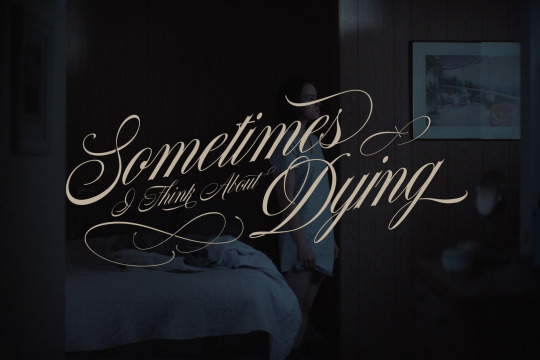
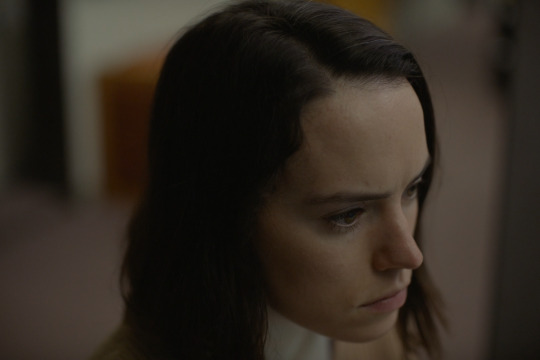
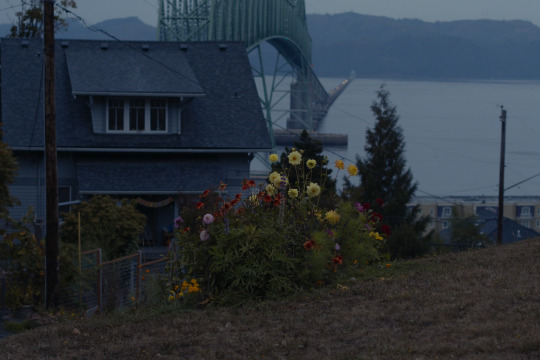
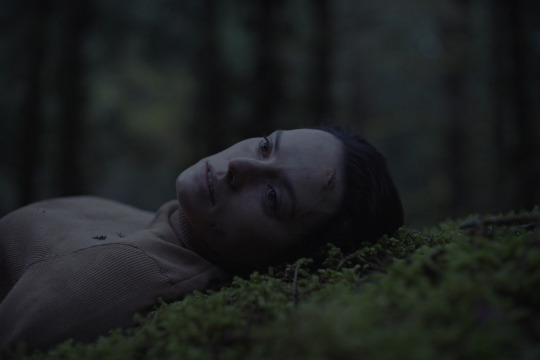

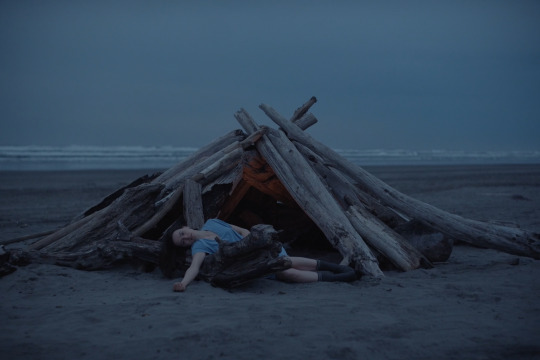

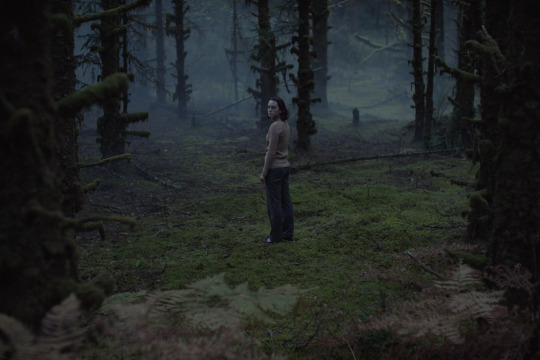

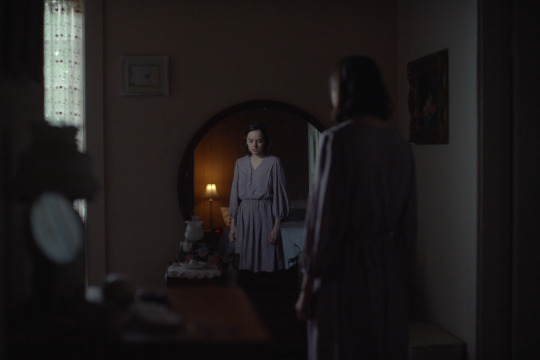
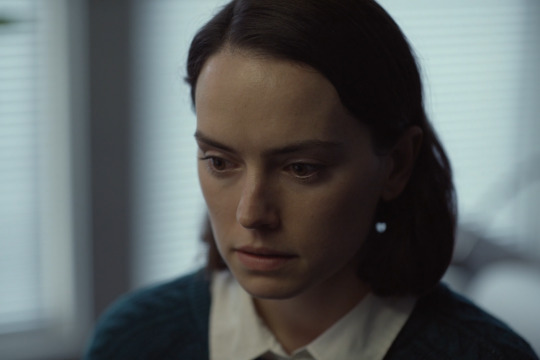
Sometimes I Think About Dying (Rachel Lambert, 2023)
#daisy ridley#sometimes i think about dying#rachel lambert#female filmmakers#female directors#female directed films#women in film#female screenwriters
92 notes
·
View notes
Text
Okay so I watched Inside Man on Netflix. It's interesting. More importantly, it's a masterclass in crafting likeable characters and how the POV we follow in a scene affects the way we see a character. Also, this somehow relates to the Star Wars Prequels, I promise! 😆
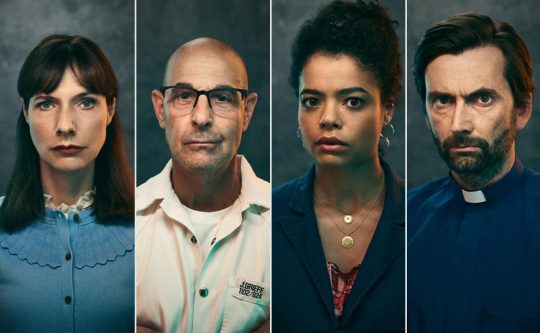
The moral of the series is that "everyone is a murderer, all it takes is a good reason and a bad day." The main characters are:
A vicar who - through a huge misunderstanding - has now locked his son's tutor in his basement and doesn't know how to get out of this situation, played by David Tennant.
A convicted murderer and ex-criminal psychology professor who solves crimes from his cell, as he waits for his execution, played by Stanley Tucci.
So a man who locked a woman in his cellar and a guy who murdered his wife. In any other movie, these guys are the villains. Yet, both of these characters are extremely likeable!
This is achieved through how relatably they behave in their relationships (kind, humble, humorous)...

... and through the emotion and/or charisma brought by the actors playing them (it's THE DOCTOR/CROWLEY and Stanley Friggin' Tucci)... but also through the amount of screen time they get.
We're with them for most of the show. There's other characters (the journalist, the trapped tutor and the vicar's wife) and subplots, of course, but they're our two anchors.
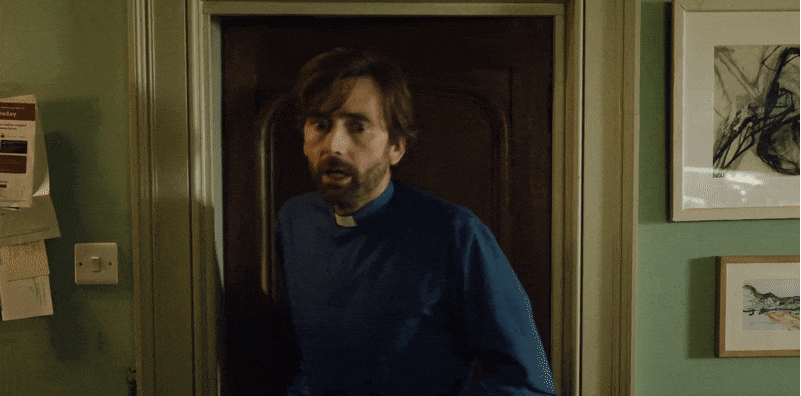
So when I'm watching David Tennant lock his son's tutor in his cellar and consider if he should free her - only to see him and his wife make things worse - I'm not thinking "you monster" like I do when I see Buffalo Bill in Silence of the Lambs for example.
No, I'm thinking "goddammit vicar you're making things worse, it'll come back to haunt you, there's still a chance to turn back, please!" I'm rooting for him to make the right choice because I'm seeing him struggle and despair and hesitate throughout many scenes.

When I'm watching Stanley Tucci guiltily say he deserves death, after being so darn charming, humble and in clear possession of a moral compass, my instinct as a viewer isn't to go "he's right".
It's to go "aaaw, no it's fine, everyone makes mistakes."
And these characters remain likeable and/or relatable for a huge chunk of time... until, every once in a while, the show reminds you that, "remember, these guys are criminals."
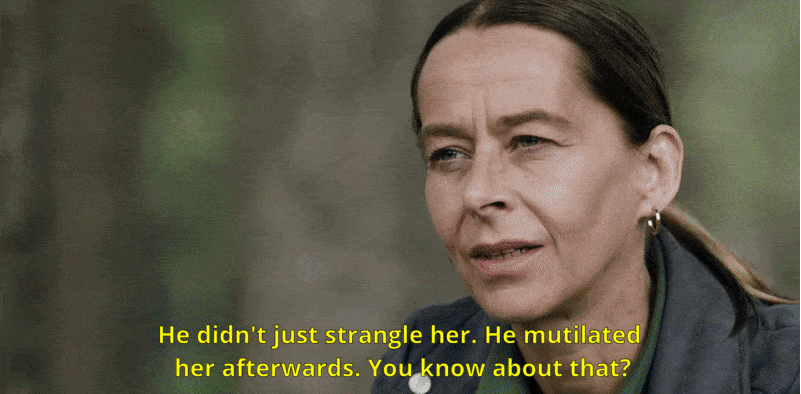
"One of them's killed his wife then decapitated her, and the other one is contemplating murder, so they did/are doing evil stuff, they're the villains and you shouldn't grow fond of them."
Then it goes back to making you empathize with them again.
It's quite the emotional roller-coaster, very intriguing yet frustrating, which I have to guess is exactly what the show is going for.
But the point is: the amount of time we spend with these characters is partially what elicits this emotional reaction out of us.
If we consider the tutor's character:
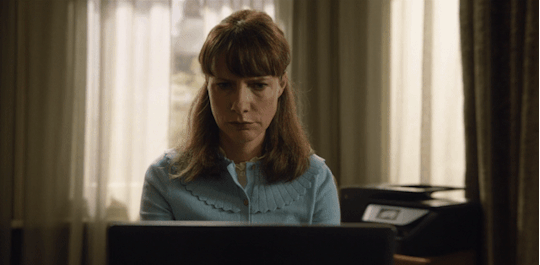
For all intents and purposes, we should feel sorry for her, or full-on fucking love her. Objectively-speaking, she's:
smart but obviously scared,
we establish early on that she has a brave heart and stands up for oppressed women,
she thinks she's trapped by a pedophile or a man defending a pedophile, figures he'll inevitably try to murder her, yet manages to stay resourceful, determined and cool-headed despite it all.
She's an absolute superhero.
But that's not how the narrative frames her.
She's framed as an antagonistic force, in the vicar's subplot.
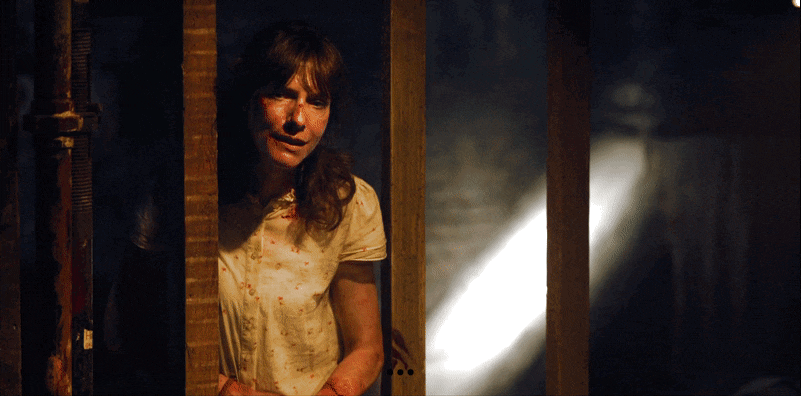
She may be the one tied up in a basement, but she's in control and the vicar is not. She's almost framed as being in a position of power (when she's really not), which leads the audience to view Tenant's vicar as an underdog.
When the vicar is trying to look for alternatives to end this situation so that he doesn't have to kill her, she's unhelpful,
and even starts pitting the vicar and his wife against each other.
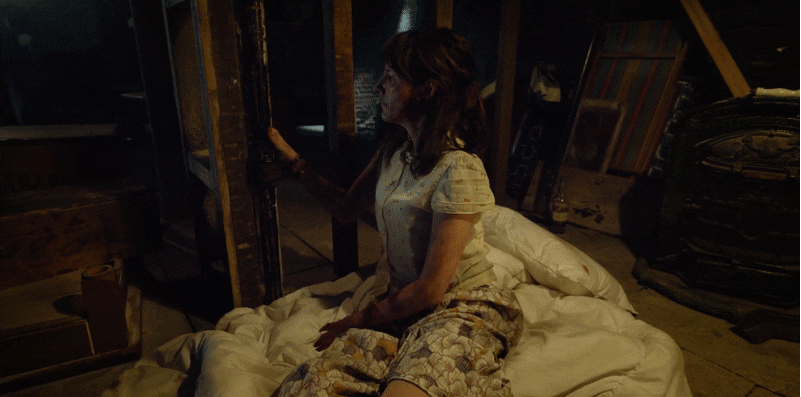
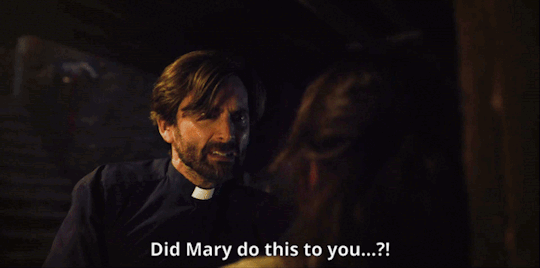
Again, in-universe, she's scared shitless and in "fight-or-flight" mode. She's putting up a front because she's just trying to get outta this alive. She's the victim, here, not the vicar who captured her.
But as a viewer, you don't feel that, despite objectively knowing that. Why and how?
Because we barely see this character, compared to Tenant's vicar. So we have more time to grow to feel for him. There's "why".
Also 90% of what we do see of the tutor is her being aggressive, manipulative, sometimes downright merciless and we're seeing her from the POV of the vicar or the vicar's wife. There's "how".
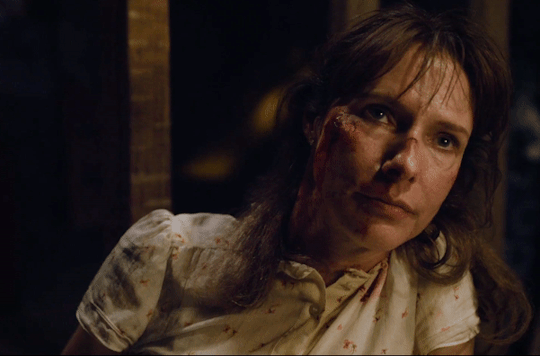
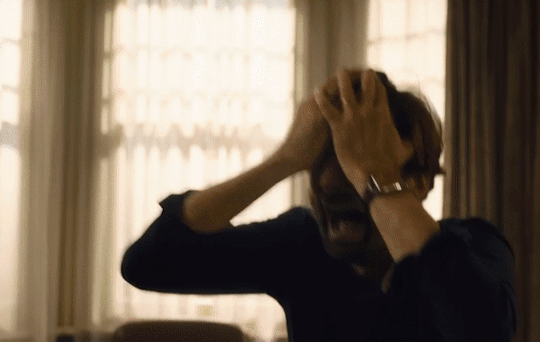
Result: the viewer feels sorry for the captor and frustrated towards the captive.
This isn't a rational reaction, it's an emotional one (the goal of any visual artform being to get an emotional reaction out of the viewer).
Which means the series and Stephen Moffat effectively did their job.
How does this relate to the Prequels?
Well, a lot of people see the Jedi in a negative light in the Prequels, and Anakin in a more sympathetic one.
Even though the Prequels are about how a good man becomes bad, and even though the Jedi embody one of the major Star Wars themes (selflesness) as opposed to Anakin who clearly displays the anti-theme (selfish)... a majority of fans feels more for the latter than the former. Why?
Because the Prequels unintentionally do what Inside Man does purposefully. You react to Anakin like you react to the vicar. You react to the Jedi like you react to the tutor.
Simply put: Anakin has more screen time than the Jedi.
And we don't just see him more, we see him struggle, we see him about what he knows to be morally right vs what he really wants, we see him be overtaken by his own fear...

... and just by contrast, that makes him more relatable than the Jedi, who have already overcome their character arcs and mostly all learned to keep their flaws in check.
The narrative doesn't intend to frame them as antagonistic. We do see them talk about how worried they are, we do see them emote.

And if you think about it, it's easy to see why:
their entire way of life is going to crap,
their values are being corrupted as they're forced to fight and die, alongside their clone brothers, in a war they wanted no part of,
they sense that the Force is close to the breaking point and that the galaxy's inhabitants are suffering on the daily.
But, for example, when Mace or Ki-Adi Mundi are shown expressing concern in the Prequels... as worried as they are, in-universe... out-of-universe, their measured reactions doesn't emotionally impact a viewer as much as Anakin's intense ones do.




So a big chunk of the audience will sympathize more with him than them. But like the tutor in Inside Man, the Jedi are objectively the victims and Anakin is objectively an unstable space-nazi who betrayed and destroyed them.
Just because we're not shown these characters be worried beyond just monotonously saying "I'm worried" doesn't mean they're not actually worried as Anakin is in Revenge of the Sith (if not more).
However we don't see it.
Because these three films aren't about the Jedi Order, they're about the Republic and about Anakin and about how each of these two beautiful things were corrupted (by Palpatine and by themselves) into becoming the very thing they stood against.
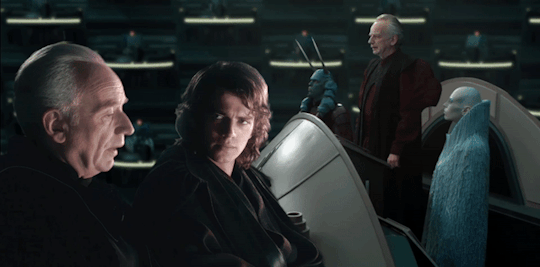

The Jedi aren't a factor in either of those two themes set up by George Lucas.
They became a factor when fans - who despite not liking the Prequels, still admirably chose to engage with the material - made the Jedi be more important to the narrative of the Prequels by re-framing these films as "The Failure of the Jedi".
Now, should Lucas have recognized that most fans wouldn't give two shits about why a Republic falls or the "matinee serial" format, and would've rather he focused on the Jedi, and developed them accordingly? Probably.
But good luck telling an indie filmmaker with a bunch of money how to tell the story he wants to tell.
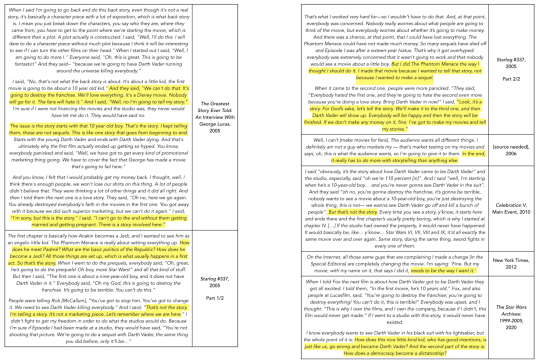
Could Lucas have done more with the Prequels to highlight the fact that the Jedi are the underdogs of the story, not Anakin's oppressors? Yes.
But, firstly, he probably didn't think that was a point that needed explaining. And secondly, as he explained at Cannes, in 2002, feature films are a very limiting format to tell a story, especially one of the Prequels' scale. If it doesn't directly contribute to the story you're telling... it's gotta go.
A limited show would've been better to cover every aspect of the Prequels more in detail and avoid confusing the audience re: who they should be rooting for.
Which is why it's interesting, to me, that Stephen Moffat used his limited show to INTENTIONALLY confuse the audience! 😃
#the screenwriter part of me was geeking out and I had to write this#one of my longest posts and it's about Inside Man of all things wtf#long post#discussion#star wars analysis#meta#SW Meta#Inside Man#inside man bbc#David Tenant#Hayden Christensen#harry watling#Anakin Skywalker#stephen moffat#george lucas#Jedi Order#Jedi Council#Mace Windu#star wars#revenge of the sith#star wars prequels#media#Netflix#BBC#dolly wells
575 notes
·
View notes
Text
Just saw an "aspiring screenwriter" on this hellsite post the dumbest, shittiest ending that they think would be "perfect" for S5. Of course it's Will being reminded by Mike that they are best friends and Will beautifully, nobly sacrificing himself to the Upside Down for the good of all.
All I can say is......don't quit your day job, kid
#shit takes#maybe don't do that#maybe don't pull a combo slowburn rejection and bury your gays#maybe don't even think about becoming a screenwriter if you have zero media literacy#the GA is silly#they are not killing will to close out the series#you absolute walnut#byler tumblr#st tumblr#byler#will byers#stranger things#s5 predictions#st5 predictions
215 notes
·
View notes
Text
stupid hyped that the WGA was able to get a deal with studios!!!! an article I read said that they wanted a minimum raise of 5% to 6% and studios only wanted to give one of 2% to 4%, and they compromised for 3.5% to 5% !!!
Article I read here!
Such a big win for all the writers!! As a fellow writer, I am quite ecstatic!!! Hopefully this means more studios will gain brains and the SAG & other groups attempting to unionize/have unionized will have their needs met!!
aaaaaa im so happy!
#wga strike#sag aftra#sag strike#support the wga#i stand with the wga#i stand with sag aftra#writers#screenwriter#actors strike#writers strike#i literally wouldn't shut up about this to all my friends at school today
146 notes
·
View notes
Text
i have many many thoughts about the portrayal of elizabeth (and henry) in adaptations of frankenstein and they need to be broadcasted immediately. feverish incoherent raving about this subject under the cut. tw for very brief mention of SA
so. elizabeth lavenza. by the time of the wedding, elizabeth is rather obviously portrayed to be just as morose and brooding as victor is, she just isn't as susceptible to episodes of mania and psychosis so it doesn't seem nearly as dramatic compared to victor's trauma. she's been through the gutter herself, being an orphan for starters, then being adopted into a family and having to assume the role of caregiver in the frankenstein family because of the coercion of her dead mother to not only take her place as the maternal figure in the family but also marry her surrogate brother (or literal cousin, depending on which version you read). then her surrogate younger brother william dies, and the within weeks she has to watch her closest heterosexual life partner justine be unjustly hung by a corrupt justice system. and she vocalizes, actively, her pessimism and hopelessness in light of these many tragedies. tldr she's fucked up and rightfully so, and while she's a little less crippled by depression than victor, she still has the distinct appearance of being rather ill, listless, and tired, especially towards the end of the novel. anyways my point is in the novel, the most important thing about elizabeth is not that she's a woman and victor's bride. yes, that's obviously the purpose she was created for, but shelley went out of her way to give elizabeth an extremely definite and unique character. she's gentle and maternal like most woman in early 19th century literature, but she's also introspective, intelligent, and perceptive. she displays agency and self-awareness repeatedly (her guilt over the locket, going to the execution of justine even when alphonse tells her not to, waxing poetic on the failures of the justice system, asking repeatedly and rather pointedly if victor actually wants to go through with the marriage, obvious anxiety and solemnity concerning the wedding) we also have to take into account that elizabeth's personality is being relayed to us BY VICTOR, and he wants to see elizabeth as docile and femininely passive, even if a lot of her actions themselves in the novel actually seem to contradict that. also, i am peppering in that many people can (and have) made a genuine and convincing argument that victor and elizabeth are not in love and were groomed to accept their union by their weirdo parents - that they care for each other, but the text includes important nuances that make it evident that victor doesn't feel anything for elizabeth like that. it is a legitimate interpretation of the book - dare i say it's the correct interpretation of the relationship between victor and elizabeth. but that's another essay for another day and it's not SUPER integral to my rant here today. it just highlights the complexity of elizabeth as a character.
so. for some fucking reason, writers do not understand this when they are adapting the novel, and do not want to apply more than eight seconds of critical thinking and the absolute shallowest 3rd grader levels of reading comprehension to this character, so they simplify her from what she was in the original novel, freshly complex, opinionated, and introspective to boring useless incest lady. victor is never portrayed with the same amount of nuance he deserves in any adaptation (also another essay for another day), because adaptations also have a very surface level reading of him as "guy who was ambitious and played god which immediately cements him as an irredeemable self-aggrandizing asshole and/or a raging insufferable narcissist who's a dick to everyone around him EXCEPT for elizabeth" but at least SOME adaptations are able to kiiinnnddaaaa capture the sympathy meant to be felt for the character in the novel. not so for elizabeth. her character in basically every adaptation can be boiled down to this: "omg victor my brother let me hammer in that you are my brother. im just going to stand here and look clueless and annoyingly naive for the entire time im on screen/stage. im just a little girl and idk what's going on victor but im gonna stay blindly devoted to you and ask numerous but completely useless questions 🥺 let me stare at you with tender worry in my eyes and treat you like a child even though we have absolutely no romantic chemistry and you're an objectifying dick towards me and we have nothing in common and the audience is actively dry heaving as we sensually make out for no other reason than to have characters in this movie sensually make out. im basically a carbon copy of original-novel-henry expect super boring and super useless because im a woman which means the doylist explanation for why im here HAS TO BE ONLY for the main character to fuck me and to hold the attention of the male viewership. now time for me to get SA'd by the creechur for basically no reason" we can observe something approximating this in basically every frankenstein adaptation i've ever seen: kenneth branagh's (my enemy) 1994 film, the 2004 hallmark miniseries, the musical, and the ballet. also in the 1931 film, but that one isn't really trying to be book-accurate so it doesn't really count for this rant.
with this understanding of elizabeth, writers then attempt to artificially generate more romance between these characters, mostly by, yes, replacing a lot of henry's role in the novel with elizabeth, hence why we see so many adaptations (1994, 2004, ballet) make elizabeth nurse victor back to health in ingolstadt instead of henry, which generates... so many problems. one problem with this is that it just sorta ruins henry's original role in the novel in one go. writers recognize that henry is supposed to be victor's character foil, but now they don't have much for him to do so he can demonstrate that role in the story since they gave all of the romantic tension moments to elizabeth. meaning that in adaptations you can tell the writers didn't really know what to do with henry because he's reduced to a comic relief bumbling idiot (1994, ballet, 2004 to an extent) with his only personality traits being "random xd" and "morals good playing god wrong!!!! 😠" (2004, musical, several independent stage adaptations). they keep him as a character foil, but just replace all of his compassion, tenderness, and devotion with elizabeth, while effectively draining henry of all of his original appeal and charm and stamping those traits onto their already stripped-of-all-nuance elizabeth. so now both henry and elizabeth are not only extremely different from their original roles in the novel but extremely, woefully less charming and complex. this especially pisses me off because it's explicitly stated in the book that henry was victor's only friend precisely because he was victor's intellectual equal, so seeing henry reduced to a smiley idiot and/or stupid generic male side character with Morals fills me with a visceral rage. writers will also sometimes make victor and henry meet in college (ballet, 1994) and try to strengthen the bond between victor and elizabeth by making it appear as though she was victor's ONLY childhood friend and companion. other times, victor and henry will be friends pre-ingolstadt (2004, musical) but most of the relationship development will be between elizabeth and victor. those two have all of the tender bonding moments while henry is just kinda inexplicably there sometimes. but i digress. this post is supposed to be about elizabeth. but IF YOU NEED A CHARACTER TO BE A SUNSHINE SOFT OPTIMISTIC LOVER FOR VICTOR IN A FRANKENSTEIN ADAPTATION, HENRY IS ABLE AND WILLING ARE YOU STEPPING ON MY BALLS
clervalstein is true. anyway
elizabeth is somehow more complex and powerful as a female character than the literal adaptations produced almost 200 years later. in adaptations, the most important thing about her is somebody else. the development of all of her character traits (which usually never go beyond standing around and looking helpless) are solely dependant on victor. she feels more like an appendage of the protagonist than an individual with thoughts and experiences separate from victor, and her character is loosely defined and flimsy so the writers can have her conform to her actions in the book whenever it's convenient and then change things up entirely that completely contradict her characterization in the book whenever it's convenient. i have no idea why the fuck this keeps happening with frankenstein adaptations (it's misogyny) and because it isn't looking like guillermo del toro's film (from what ive heard) is going to be super book accurate, i dont foresee too much of a shift in frankenstein adaptations.
look i get it. it's a movie/play/ballet which lasts like 2 hours and you have a lot to do and not a lot of time to do it. i understand you have to make sacrifices for brevity and these characters are, frankly, a lot less interesting and exciting than victor and creechur. people didn't come to see john hughes levels of charm and complexity in the side characters, they came to watch the creechur do scary shit and for victor to say IT'S ALIVE 😱 and be an evil mad scientist you love to hate. they came for their values of "it's wrong to play god!!!" and "too much ambition bad!!!" to be re-cemented even though that's not even the original point of the novel. which is why imo if you're going to adapt frankenstein in a manner that does justice to the beautiful and sublime subtlety of the original novel, it needs to be either a miniseries or a REALLY LONG film. it's a short book, but it's very eventful, and imo for an adaptation to work you have to let the audience sit with it. which is why you all need to donate to my gofundme so i can produce an honest to god frankenstein adaptation. in fact, im running for president in this year's primaries :3
just a disclaimer: im not an academic or a scholar or anything. i just like the book. i probably have no idea what the fuck im talking about. but im a very very passionate little guy and this has been my rant
#frankenstein#literary analysis#avo's soap box#i wish i was more articulate#i dont even know if this rant is intelligible 💀#there's not even a main point really im just rambling#i wish i could drop all of my life plans and become a screenwriter so i could produce a frankenstein adaptation#they don't know the book like i know the book </3#there's no gofundme by the way i was just joe king#this is also a problem to a lesser extent in adaptations of dracula and c&p#with mina harker and dunya raskolnikov respectively#but i don't have the energy to go on a whole separate tirade about that#im so normal about classic lit guys it's ok
61 notes
·
View notes
Text
Small-town Stephen King books are my favourite, and for obvious reasons they are similar to Stranger Things (literally a direct inspiration in the case of The Body/Stand By Me, and IT). I’m reading ‘Salem’s Lot currently and there’s just a quote that stuck out to me:
“There’s little good in sedentary small towns. Mostly indifference spiced with an occasional vapid evil - or worse, a conscious one.”
This is the main principle of IT too; It represents the hatred and bigotry within small towns in that era, and how that cruelty begins to taint the innocence and freedom of childhood as you grow older. Like Hawkins, it’s not a coincidence that Derry or the Lot are being tormented with “evil.” The evil is just a physical manifestation of everything wrong with the fabric of those towns and the so-called “norm.” This is why we’re going to see characters like Will, who continue to love despite everything thrown their way, get a happy ending. The supernatural threats are entwined with these themes, hence why it’s not just about beating Vecna (who is a product of being Other’d, and the environment Hawkins has fostered) and the mind Flayer or whatever. The inherent issues with Hawkins which allowed these things to happen in the first place need to be changed. Humans and their capacity for cruelty are the true conscious evils.
#and so their capacity for love needs to be the cure#(this is where Will comes in btw)#he’s gonna have his Luke skywalker arc#anyway#FORCED CONFORMITY#THATS WHATS KILLINNGGGG THE KIDDDDSSSS#byler#<- target audience#I can talk for hours about the parallels between SK and ST#meta#stranger things#this is like what that screenwriter said on a podcast a little while ago#about how we’ll find out why Hawkins is being targeted
26 notes
·
View notes
Text
honestly, Everything Everywhere All At Once winning so much at the Oscars, between the film itself and its cast and crew, it really feels like: "You can do it, you can make the thing, you can accomplish great work, even when it feels futile or too late to do it, you absolutely can and it matters and is good."
#Anyway trying not to cry on the bus about it#This is not a post to kvetch about the specifics of the awards. This is about looking at what everyone there achieved and feeling hopeful.#really good for my little struggling screenwriter soul#anyway watch eeaao
251 notes
·
View notes
Text
The whole issue of Joke and Zo was so well done written. Because Zo's anger and disappointment in Pat and Joke can be understood with no discuss, but at the end of the episode it is shown that Zo outgrew his experience. Like he didn't even think to part ways with Joke. He only waited for Joke to speak the truth like he promised an episode ago, an honest discussion. Yes, he was hurt and dissapointed with their behavior because that was not how friendship and relationship works but there were no thoughts about sudden breakup or dramatic hysteric. From the beginning Zo only wanted the truth and he patiently waited for Joke to admit his lie and not try to hush it with gifts and flowers. He literally said that he gave Joke a multiple chances which shows that he, in fact, really loves Joke and believes that his feelings were real (unlike issue with Puen) but he needs to understand that it can't always be like this, that relationship can't work like this. And Zo forgave Joke out loud only when Joke honestly confessed to him about everything. And also this is the proof that Zo worked through the traumatic expirience with Puen and learned to trust someone again. It's amazing actually
#hidden agenda#hidden agenda the series#jokezo#joke x zo#this whole issue are very personal to me#and while my therapist helps me with this Zo did it himself#i have so many thoughts about this#also I really like that it was just Pat as the main problem. it felt so realistic#and not some dramatic shit that screenwriters like to write
76 notes
·
View notes
Text
3 Important things about Traditional Publishing
This post is for people who want to be traditionally published. If you’re down to Indie publish, or are only interested in posting your own fiction online—don’t worry about it!
First things first, traditional (or trad) publishing is when you go through an editor at a publishing house and they publish your book. They also take a hefty percentage of the profits, but handle the editing, cover design, titling, promotion, etc. for you. Sometimes you may also go through a literary agent who will represent you (send your work and advocate for you) to publishing houses.
Indie publishing (independent) is when you do it on your own, also known as self publishing. You have more control, but have to build a team behind you to help you edit, design, format, promote, etc. (or do it all yourself). and it can be difficult to get your book in places like book stores and libraries since they usually only do dealings with publishing houses.
With that out of the way, let’s talk 3 important things I know about trad publishing.
1. Don’t share your work online
If you want to be traditionally published, don’t post any of your work online anywhere. Including little bits and pieces, including excerpts, including characters, including titles. Nothing. Keep it locked down.
This is because many trad publishing contracts will consider you posting your work online as it being “previously published”, and may reject your work for that reason. To be on the safe side, don’t put any of your work online or submit it to other journals/magazines.
2. Be prepared to let go of some of the decision making.
When you go through lit agents and publishing houses, you give up an amount of creative control to get your work published. They just want to make it as good (and marketable) as possible, so trust that they know what they’re talking about.
This means they may choose your title, you may not have any control over the cover image, they might even ask you to get rid of a character or change the ending or any other amount of larger edits. You are allowed to reject some ideas, but choose your battles. Taking this feedback and making these edits is what will get your work published, so if that is your goal, be accommodating, trust that they have so much experience and will make your work better.
3. You should NEVER have to pay them
If you’re paying a traditional publisher to publish your work, you are being scammed. The money works this way:
The reader buys the book for say $20.
To make this simple, let’s say $20 then goes to the publishing house.
They take 50%, so $10 goes to your literary agent (if you have one).
They take another 50% so $5 goes to you.
Never, ever should the money be flowing the opposite direction where you are giving money to these businesses to publish your work. I will say it again, if you are paying these people, you are being scammed.
This is really important, because I knew a girl who was working three jobs to get her work published. They were asking for almost 20K. My heart absolutely breaks for her—she just didn’t know that that’s not how it’s supposed to work.
Whether it’s 20k, $100, or 3 cents. You don’t pay them.
(Of course, if you’re in indie publishing this is a whole different story. In indie, you pay people to do any of the work you don’t want to do. If you need an indie editor, you pay them, if you want an artist to design your cover, you pay them. This rule only applies to trad publishing!)
Anything else important that I missed?
#writing#creative writing#writers#screenwriting#writing community#writing inspiration#filmmaking#books#film#writing advice#traditional publishing#getting trad published#traditional publishing advice#3 important things about traditional publishing
168 notes
·
View notes
Text
Me: I'm going to get back into writing fanfiction for a fun creative writing outlet, while I work on other humanities and social sciences in classwork :)
Also me: Has now read at least one official medical study, multiple interest/support group and government reports, and several online testimonials re: House's possible amputation vs. non-narcotic pain treatments sans amputation, and now has a pretty good mental chart going of decidedly STEM things.
I have been tricked into researching STEM. Creative writing has betrayed me.
#house md#gregory house#fanfiction#hatecrimes md#if anyone is interested my research so far: it seems like while phantom limb pain is likely#it is manageable using the same things he would otherwise use + other things not otherwise available#and is more likely to go away and/or be less severe#the study conducted using data from people who suffered multiple kinds of chronic pain shows 81% were glad they amputated#not to mention that the House TV show “we create medical fact” ethos suggests House has a random cure for phantom limb pain#based on that one s6 episode#I now know many weird medical things that I only sort of understand but could possibly be used in writing#Is this what being a House screenwriter feels like?#This explains why some episodes are medically dubious: a bunch of humanities majors with loose grasps of medicine just rolling with it#Anyway I'm still unlikely to write a longer fic about this specific issue unless I do more research over time
41 notes
·
View notes
Text
Lavender and queerness in The Dragon Prince
We all know a character being described using the adjective "lavender" is a big flashing neon QUEER sign, right. There's a lot of that in TDP, and I need to scream into the void about it.
Opals--both stereotypical/most common real ones and TDP moon opals--are very much not purple.
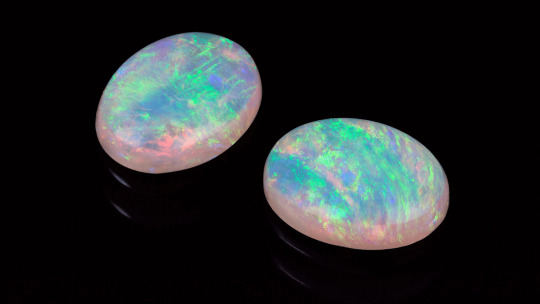
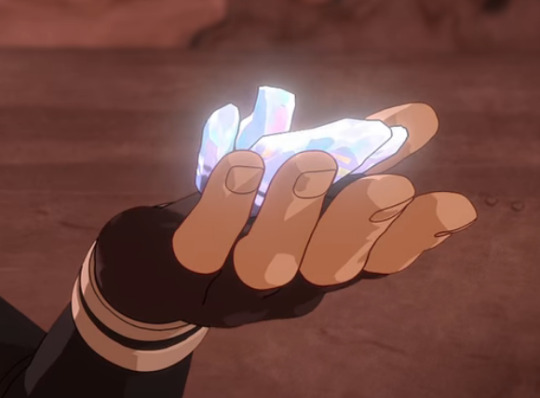
But Runaan and Ethari's necklaces are.
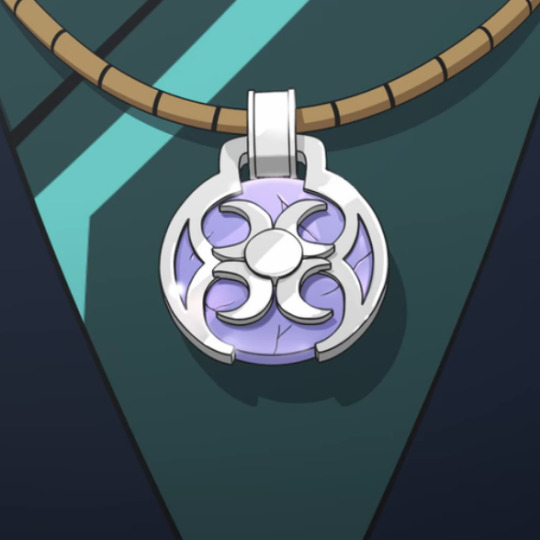
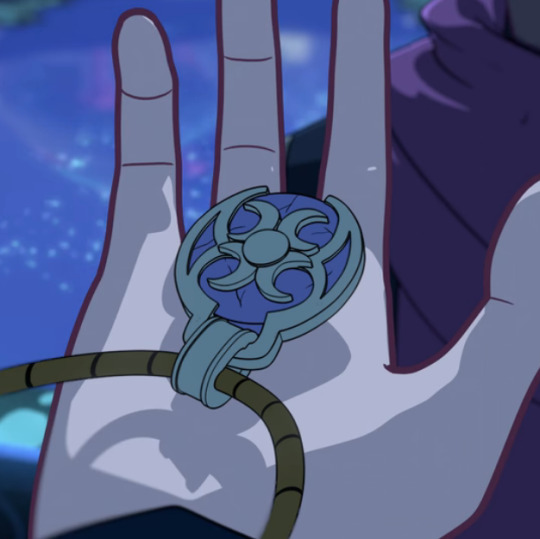
That is the shade of purple you think of when someone says "lavender".
Viren's--not a canon queer character, but a queer-coded one--significant artifact also has an element of purple. The Staff of Ziard has a purple gem, and his outfit does as well. (Not to mention the literal child he and Aaravos made together, but since that's a Startouch being, I'll get to that in a minute.)
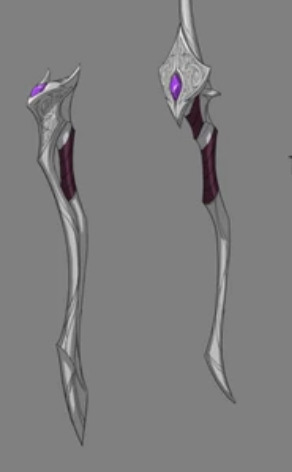
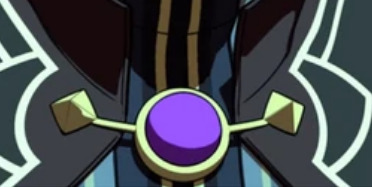
And Aaravos is just drenched in both gay sluttiness and purple, and his child--created with another queer-coded character--is also purple.
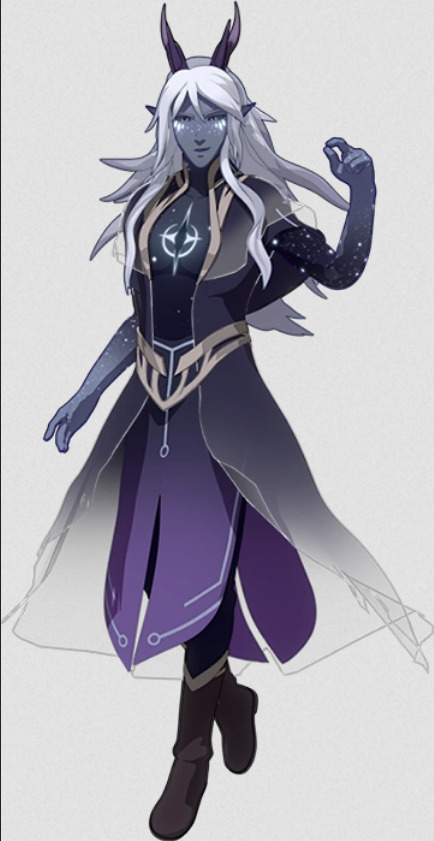
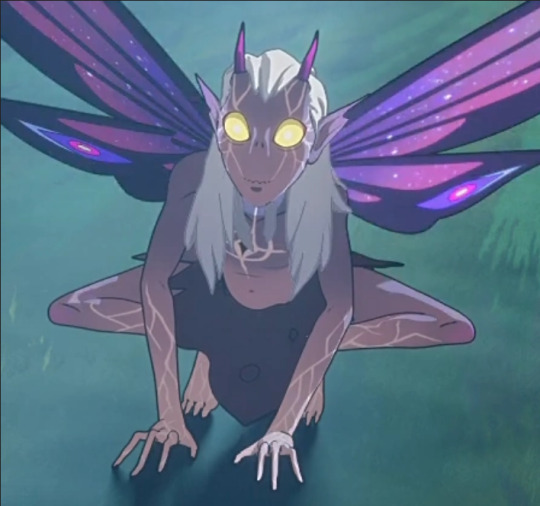
(Last two image descriptions taken from the official TDP wiki.)
From what I'm gathering, though, Startouch elves seem to wear a lot of purple in general. But Aaravos is very much queer-coded.
Soren is also very queer-coded from where I'm standing, especially when it comes to his relationship with Corvus. And we get this moment in season 5:
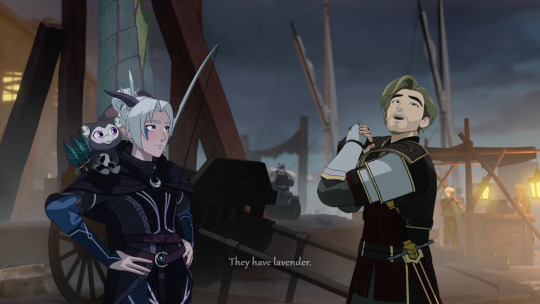
Whenever a character says the word "lavender", my mind immediately goes to "Okay, so that character is queer."
Lavender and queerness has been at the forefront of my mind lately, so I am fixating on this and need to scream into the void of Tumblr about it. But unless I'm forgetting something, every key/signature purple artifact belongs to a canon queer or queer-coded character.
#with how good the screenwriting is it makes me wonder if they knew what they were doing#like with the ''my hair smells like lavender'' line in nimona#ambrosius ''my hair smells like lavender'' goldenloin and crownguard ''they have lavender oils'' soren#lavender and queerness have been at the forefront of my mind lately and i need to scream into the void about it#the dragon prince#aaravos#ruthari#viren#meta
56 notes
·
View notes
Text
While playing Pikmin 4 yesterday, I got a dialoge from Chewy (unlocked after you complete her quest) where she says that Santi has a habit of jumping jobs when he runs into his "rival" (re: Bernard). We know they both worked for boxed lunch vendors in the past. Santi had gone on to be a fortune teller, cafe manager, and script writer (and maybe more I forget).
This thus implies that Bernard has ALSO had these jobs, or adjacent positions.
Shepard also says that Bernard became a pilot because of Santi, but was one before Santi was (having been his instructor). This doesn't really fit in with my main point it's just cute and I wanted to point it out.
These two have led FACINATING lives and we only get to see the tip of the iceberg with it. I need a spin-off comic just about these two, please.
#pikmin#bernard pikmin#santi pikmin#I think about them a normal amount (lie)#What if Bernard was an actor in one of Santi's movies#What if they had a coffee shop AU but it was canon#I wonder if Beaux was in any of Santi's movies#Or tv shows he may have been a screenwriter for a show idk#I need more about these two there's so much going on there
26 notes
·
View notes
Text

don't you all miss shows like this. where the homosexuality is in the subtext? hidden in the editing and blocking and mirroring and the music choices and
#honestly i learned so much about screenwriting from meta analysis...#it's 2005 and the hays code is still intact#house md
15 notes
·
View notes
Text
In Reservation Dogs, a theme that comes up frequently is an unspoken tension between generations and how they interact with things such as death, as in Mabel.
Elora is increasingly shaken by all the adults coming together to remember a woman she didn't know. And she was in a position where bringing up the version of Mabel she knew, an unaffectionate and sarcastic woman, seemed inappropriate. To exacerbate this, Aunt Teenie sees Cookie in her and leans on Elora despite them being practically strangers and expecting her to understand. She also gives Elora a glimpse into who she could be like, leaving the Village due to a loved one's death. Throughout the episode Elora is anxious about her feelings mismatching everyone else's. We've previously only had a small glimpse into Elora's life with Mabel as she tried to say goodbye to her in S1. Its not clear if Mabel was someone Elora somewhat hated or had otherwise complicated feelings about.
At the moment Mabel dies, Elora is completely overwhelmed. This is the second time shes seen the face of a deceased loved one in recent memory. Her Aunt Teenie hugs her, looking for mutual comfort that Elora is too in-shock to provide.
When she goes out for air to the backyard, where Bear previously met with his Spirit friend, she sees Mabel. And Mabel says goodbye and acts exactly how Elora remembers her, unaffectionate and sarcastic. Elora smiles and laughs and looks relieved. Mabel, in an indirect expression of love, gives Elora the space to love and remember her as she knew her, not the person she was before Cookie died.
#reservation dogs#absolute ramblings#i just watched the new episode#i really like this show#it gives me THOUGHTS#about SCREENWRITING#discussing the blue curtains#reservation dogs spoilers#i keep making edits to this to word stuff better sorry
368 notes
·
View notes